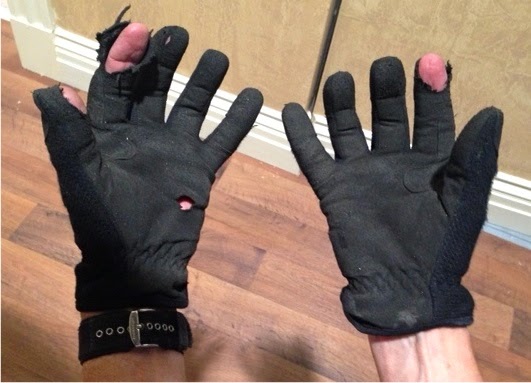Sometimes you just have to hang on and hope for the best...
Three weeks into the new season, it’s abundantly clear exactly how we’re going to create twenty-two episodes of this show in only seventeen work-weeks. Our block-and-shoot day -- when the actors block each scene with all four cameras, then do the scheduled pre-shoots for that episode -- is Wednesday, and it seems we’ll be shooting anywhere from four to seven scenes of a future episode on each one of those block-and-shoot days. In addition to the work required to make the current episode, we’ll grind out an additional third of another episode every week, with the director for that show coming in just long enough to shoot those scenes. That's why we've had two directors working each block-and-shoot day thus far. Using this tag-team approach, our seventeen weeks of work will deliver twenty-two shows to the network, which came up with such a diabolically clever way of wringing more labor ("increased productivity," in the jargon of the business world) from the workers while paying us commensurately less.
This is good for them and bad for us, but such is life in the New Hollywood, which seems to be following Wall Street’s lead in aggressively seeking out every possible strategy to transfer money from the wallets of the people who do the hard, dirty work on the factory floor to those who plant their three hundred dollar shoes on the desk and yak on the phone while gazing out a corner-office window high up in the executive suites. Once again the 99% tighten their belts while the 1% grow ever fatter. I’m tempted to say “some things never change,” but the truth is things are changing, and not for the better.
Thus our block-and-shoot days will be very busy this season, which is why I've begun referring to hump-day as Big Wednesday.*
There's only one bit of good news I can find in this. The producers realized that making such a compressed schedule work while avoiding going into expensive overtime at least once a week (which would reduce the cost-savings all this pre-shooting is supposed to generate) would require hiring a slate of very competent directors. In years past we were often saddled with directorial hacks whose indecisiveness, poor communication skills, and apparent need to over-complicated a relatively simply process invariably showed our forward progress to a slog. With such directors at the helm, the block-and-shoot days became a tedious exercise in eye-rolling, clock-watching frustration.
Those Wednesdays weren't much fun.
Of course, they don’t call it “work” for nothing, and there’s no law that says a day on set has to be fun... but one reason those of us who work in the multi-camera world do so is because our days on set can be fun -- and with a good director, they usually are.
A bad director? They're no fun at all.
So there won't be any deadwood in the director’s chair this season -- I checked the names, and every director on our schedule knows what he-or-she is doing, which makes a huge difference. Big Wednesdays will still run considerably later than in season's past, but so long as we continue to beat the 12 hour guarantee, I can't really complain.
Still, just once it would be nice to have it all for a season: full scale, decent budgets, good scripts, and quality directors -- which would be just about as close to heaven as working in television can get.
And you know what? I'm sure it'll happen one of these days.
And you know what? I'm sure it'll happen one of these days.
In my dreams...









